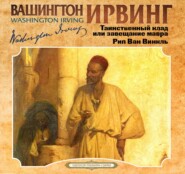По всем вопросам обращайтесь на: info@litportal.ru
(©) 2003-2024.
✖
An Old Fashioned Christmas Day
Настройки чтения
Размер шрифта
Высота строк
Поля
We were ushered into this banqueting scene with the sound of minstrelsy, the old harper being seated on a stool beside the fireplace, and twanging his instrument with a vast deal more power than melody.
The parson said grace, which was not a short, familiar one, such as is commonly addressed to the Deity in these unceremonious days; but a long, courtly, well-worded one of the ancient school.
There was now a pause, as if something was expected; when suddenly the butler entered the hall with some degree of bustle; he was attended by a servant on each side with a large wax-light, and bore a silver dish, on which was an enormous pig’s head, decorated with rosemary, with a lemon in its mouth, which was placed with great formality at the head of the table. The moment this pageant made its appearance, the harper struck up a flourish.
Though prepared to witness many of these little eccentricities, from being apprised of the peculiar hobby of mine host; yet, I confess, the parade with which so odd a dish was introduced somewhat perplexed me, until I gathered from the conversation of the Squire and the parson that it was meant to represent the bringing in of the boar’s head: a dish formerly served up with much ceremony, and the sound of minstrelsy and song, at great tables on Christmas Day. ‘I like the old custom,’ said the Squire, ‘not merely because it is stately and pleasing in itself, but because it was observed at the College of Oxford, at which I was educated. When I hear the old song chanted, it brings to mind the time when I was young and gamesome-and the noble old college-hall-and my fellow-students loitering about in their black gowns: many of whom, poor lads, are now in their graves!’
The table was literally loaded with good cheer, and presented an epitome of country abundance, in this season of overflowing larders. A distinguished post was allotted to ‘ancient sirloin,’ as mine host termed it: being, as he added, ‘the standard of old English hospitality, and a joint of goodly presence, and full of expectation.’
When the cloth was removed, the butler brought in a huge silver vessel of rare and curious workmanship, which he placed before the Squire. Its appearance was hailed with acclamation; being the Wassail Bowl, so renowned in Christmas festivity. The contents had been prepared by the Squire himself.
The old gentleman’s whole countenance beamed with a serene look of indwelling delight, as he stirred this mighty bowl. Having raised it to his lips, with a hearty wish of a merry Christmas to all present, he sent it brimming, around the board, for every one to follow his example, according to the primitive style; pronouncing it ‘the ancient fountain of good feeling, where all hearts meet together.’
There was much laughing and rallying, as the honest emblem of Christmas joviality circulated, and was kissed rather coyly by the ladies. When it reached Master Simon he raised it in both hands, and with the air of a boon companion, struck up an old Wassail chanson:
The browne bowle,
The merry browne bowle.
As it goes round about-a,
Fill
Still,
Let the world say what it will,
And drink your fill all out-a.
The deep canne,
The merry deep canne,
As thou dost freely quaff-a,
Sing,
Fling,
Be as merry as a king,
And sound a lusty laugh-a.[1 - From “Poor Robin’s Almanack.”]
The dinner-time passed away in this flow of innocent hilarity; and, though the old hall may have resounded in its time with many a scene of broader rout and revel, yet I doubt whether it ever witnessed more honest and genuine enjoyment.
When the ladies had retired, the conversation, as usual, became still more animated. The Squire told several long stories of early college pranks and adventures.
I found the tide of wine and wassail fast gaining on the dry land of sober judgment. The company grew merrier and louder as their jokes grew duller. Master Simon was in as chirping a humour as a grasshopper filled with dew; his old songs grew of a warmer complexion, and he began to talk maudlin about the widow.
After the dinner-table was removed, the hall was given up to the younger members of the family, who made its old walls ring with their merriment, as they played at romping games. Master Simon, who was the leader of their revels, and seemed on all occasions to fulfil the office of that ancient potentate, the Lord of Misrule, was blinded in the midst of the hall. The little beings were as busy about him as the mock fairies about Falstaff; pinching him, plucking at the skirts of his coat, and tickling him with straws.
When I returned to the drawing-room, I found the company seated around the fire, listening to the parson, who was deeply ensconced in a high-backed oaken chair. From this venerable piece of furniture, with which his shadowy figure and dark weazen face so admirably accorded, he was dealing forth strange accounts of popular superstitions and legends of the surrounding country, with which he had become acquainted in the course of his antiquarian researches. He gave us several anecdotes of the fancies of the neighbouring peasantry, concerning the effigy of the crusader which lay on the tomb by the church altar. It was said to get up from the tomb and walk the rounds of the churchyard in stormy nights, particularly when it thundered. Some talked of gold and jewels buried in the tomb, over which the spectre kept watch; and there was a story current of a sexton in old times who endeavoured to break his way to the coffin at night; but just as he reached it, received a violent blow from the marble hand of the effigy, which stretched him senseless on the pavement. From these and other anecdotes that followed, the crusader appeared to be the favourite hero of ghost stories throughout the vicinity.
Whilst we were all attention to the parson’s stories, our ears were suddenly assailed by a burst of heterogeneous sounds from the hall, in which was mingled something like the clang of rude minstrelsy, with the uproar of many small voices and girlish laughter. The door suddenly flew open, and a train came trooping into the room, that might almost have been mistaken for the breaking up of the court of Fairy. That indefatigable spirit, Master Simon, in the faithful discharge of his duties as Lord of Misrule, had conceived the idea of a Christmas mummery, or masking. The old housekeeper had been consulted; the antique clothes-presses and wardrobes rummaged and made to yield up the relics of finery that had not seen the light for several generations.
Master Simon led the van, as ‘ancient Christmas,’ quaintly apparelled in a ruff, a short cloak, which had very much the aspect of one of the old housekeeper’s petticoats, and a hat that might have served for a village steeple, and must indubitably have figured in the days of the Covenanters. From under this his nose curved boldly forth, flushed with a frost-bitten bloom, that seemed the very trophy of a December blast. He was accompanied by the blue-eyed romp, dished up as ‘Dame Mince-Pie,’ in the venerable magnificence of faded brocade, long stomacher, peaked hat, and high-heeled shoes. The rest of the train had been metamorphosed in various ways; the girls trussed up in the finery of the ancient belles of the Bracebridge line, and the striplings bewhiskered with burnt cork, and gravely clad in broad skirts, hanging sleeves, and full-bottomed wigs, to represent characters celebrated in ancient maskings.
The irruption of this motley crew, with beat of drum, according to ancient custom, was the consummation of uproar and merriment. Master Simon covered himself with glory by the stateliness with which, as Ancient Christmas, he walked a minuet with the peerless, though giggling, Dame Mince-Pie. It was followed by a dance of all the characters-a medley of quaint costumes.
The worthy Squire contemplated these fantastic sports, and the resurrection of his old wardrobe, with the simple relish of childish delight.
But enough of Christmas and its gambols; it is time for me to pause in this garrulity. In writing to amuse, if I fail, the only evil is my own disappointment. If, however, I can by any lucky chance, in these days of evil, rub out one wrinkle from the brow of care, or beguile the heavy heart of one moment of sorrow; if I can now and then penetrate through the gathering film of misanthropy, prompt a benevolent view of human nature, and make my reader more in good humour with his fellow-beings and himself, surely, surely, I shall not then have written entirely in vain.
notes
1
From “Poor Robin’s Almanack.”
The parson said grace, which was not a short, familiar one, such as is commonly addressed to the Deity in these unceremonious days; but a long, courtly, well-worded one of the ancient school.
There was now a pause, as if something was expected; when suddenly the butler entered the hall with some degree of bustle; he was attended by a servant on each side with a large wax-light, and bore a silver dish, on which was an enormous pig’s head, decorated with rosemary, with a lemon in its mouth, which was placed with great formality at the head of the table. The moment this pageant made its appearance, the harper struck up a flourish.
Though prepared to witness many of these little eccentricities, from being apprised of the peculiar hobby of mine host; yet, I confess, the parade with which so odd a dish was introduced somewhat perplexed me, until I gathered from the conversation of the Squire and the parson that it was meant to represent the bringing in of the boar’s head: a dish formerly served up with much ceremony, and the sound of minstrelsy and song, at great tables on Christmas Day. ‘I like the old custom,’ said the Squire, ‘not merely because it is stately and pleasing in itself, but because it was observed at the College of Oxford, at which I was educated. When I hear the old song chanted, it brings to mind the time when I was young and gamesome-and the noble old college-hall-and my fellow-students loitering about in their black gowns: many of whom, poor lads, are now in their graves!’
The table was literally loaded with good cheer, and presented an epitome of country abundance, in this season of overflowing larders. A distinguished post was allotted to ‘ancient sirloin,’ as mine host termed it: being, as he added, ‘the standard of old English hospitality, and a joint of goodly presence, and full of expectation.’
When the cloth was removed, the butler brought in a huge silver vessel of rare and curious workmanship, which he placed before the Squire. Its appearance was hailed with acclamation; being the Wassail Bowl, so renowned in Christmas festivity. The contents had been prepared by the Squire himself.
The old gentleman’s whole countenance beamed with a serene look of indwelling delight, as he stirred this mighty bowl. Having raised it to his lips, with a hearty wish of a merry Christmas to all present, he sent it brimming, around the board, for every one to follow his example, according to the primitive style; pronouncing it ‘the ancient fountain of good feeling, where all hearts meet together.’
There was much laughing and rallying, as the honest emblem of Christmas joviality circulated, and was kissed rather coyly by the ladies. When it reached Master Simon he raised it in both hands, and with the air of a boon companion, struck up an old Wassail chanson:
The browne bowle,
The merry browne bowle.
As it goes round about-a,
Fill
Still,
Let the world say what it will,
And drink your fill all out-a.
The deep canne,
The merry deep canne,
As thou dost freely quaff-a,
Sing,
Fling,
Be as merry as a king,
And sound a lusty laugh-a.[1 - From “Poor Robin’s Almanack.”]
The dinner-time passed away in this flow of innocent hilarity; and, though the old hall may have resounded in its time with many a scene of broader rout and revel, yet I doubt whether it ever witnessed more honest and genuine enjoyment.
When the ladies had retired, the conversation, as usual, became still more animated. The Squire told several long stories of early college pranks and adventures.
I found the tide of wine and wassail fast gaining on the dry land of sober judgment. The company grew merrier and louder as their jokes grew duller. Master Simon was in as chirping a humour as a grasshopper filled with dew; his old songs grew of a warmer complexion, and he began to talk maudlin about the widow.
After the dinner-table was removed, the hall was given up to the younger members of the family, who made its old walls ring with their merriment, as they played at romping games. Master Simon, who was the leader of their revels, and seemed on all occasions to fulfil the office of that ancient potentate, the Lord of Misrule, was blinded in the midst of the hall. The little beings were as busy about him as the mock fairies about Falstaff; pinching him, plucking at the skirts of his coat, and tickling him with straws.
When I returned to the drawing-room, I found the company seated around the fire, listening to the parson, who was deeply ensconced in a high-backed oaken chair. From this venerable piece of furniture, with which his shadowy figure and dark weazen face so admirably accorded, he was dealing forth strange accounts of popular superstitions and legends of the surrounding country, with which he had become acquainted in the course of his antiquarian researches. He gave us several anecdotes of the fancies of the neighbouring peasantry, concerning the effigy of the crusader which lay on the tomb by the church altar. It was said to get up from the tomb and walk the rounds of the churchyard in stormy nights, particularly when it thundered. Some talked of gold and jewels buried in the tomb, over which the spectre kept watch; and there was a story current of a sexton in old times who endeavoured to break his way to the coffin at night; but just as he reached it, received a violent blow from the marble hand of the effigy, which stretched him senseless on the pavement. From these and other anecdotes that followed, the crusader appeared to be the favourite hero of ghost stories throughout the vicinity.
Whilst we were all attention to the parson’s stories, our ears were suddenly assailed by a burst of heterogeneous sounds from the hall, in which was mingled something like the clang of rude minstrelsy, with the uproar of many small voices and girlish laughter. The door suddenly flew open, and a train came trooping into the room, that might almost have been mistaken for the breaking up of the court of Fairy. That indefatigable spirit, Master Simon, in the faithful discharge of his duties as Lord of Misrule, had conceived the idea of a Christmas mummery, or masking. The old housekeeper had been consulted; the antique clothes-presses and wardrobes rummaged and made to yield up the relics of finery that had not seen the light for several generations.
Master Simon led the van, as ‘ancient Christmas,’ quaintly apparelled in a ruff, a short cloak, which had very much the aspect of one of the old housekeeper’s petticoats, and a hat that might have served for a village steeple, and must indubitably have figured in the days of the Covenanters. From under this his nose curved boldly forth, flushed with a frost-bitten bloom, that seemed the very trophy of a December blast. He was accompanied by the blue-eyed romp, dished up as ‘Dame Mince-Pie,’ in the venerable magnificence of faded brocade, long stomacher, peaked hat, and high-heeled shoes. The rest of the train had been metamorphosed in various ways; the girls trussed up in the finery of the ancient belles of the Bracebridge line, and the striplings bewhiskered with burnt cork, and gravely clad in broad skirts, hanging sleeves, and full-bottomed wigs, to represent characters celebrated in ancient maskings.
The irruption of this motley crew, with beat of drum, according to ancient custom, was the consummation of uproar and merriment. Master Simon covered himself with glory by the stateliness with which, as Ancient Christmas, he walked a minuet with the peerless, though giggling, Dame Mince-Pie. It was followed by a dance of all the characters-a medley of quaint costumes.
The worthy Squire contemplated these fantastic sports, and the resurrection of his old wardrobe, with the simple relish of childish delight.
But enough of Christmas and its gambols; it is time for me to pause in this garrulity. In writing to amuse, if I fail, the only evil is my own disappointment. If, however, I can by any lucky chance, in these days of evil, rub out one wrinkle from the brow of care, or beguile the heavy heart of one moment of sorrow; if I can now and then penetrate through the gathering film of misanthropy, prompt a benevolent view of human nature, and make my reader more in good humour with his fellow-beings and himself, surely, surely, I shall not then have written entirely in vain.
notes
1
From “Poor Robin’s Almanack.”

















